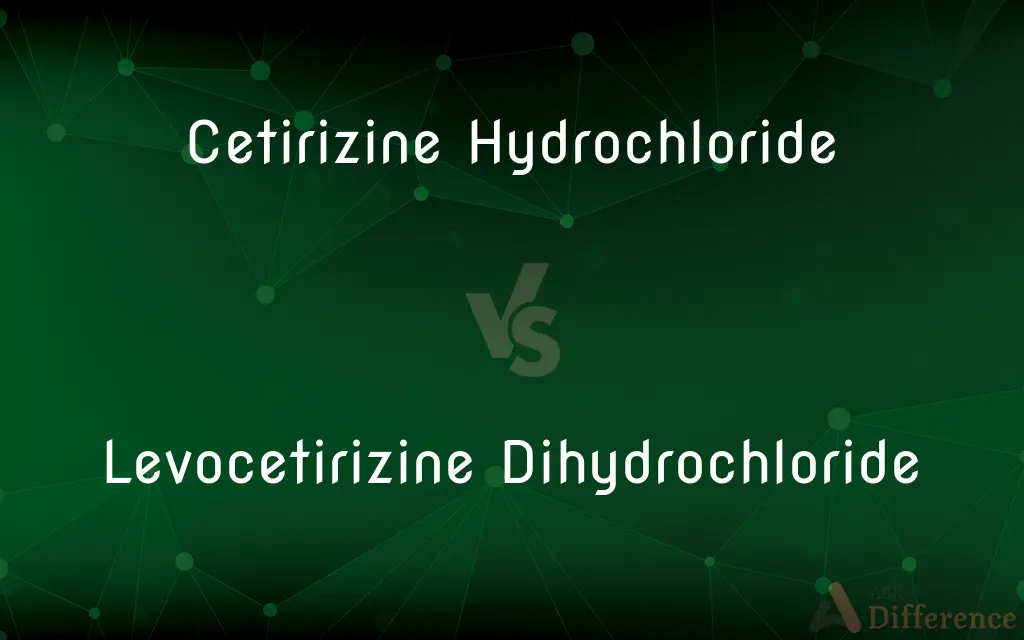Cetirizine Hydrochloride vs. Levocetirizine Dihydrochloride — What's the Difference?
By Tayyaba Rehman — Published on November 1, 2023
Cetirizine Hydrochloride and Levocetirizine Dihydrochloride are antihistamines, with the latter being the active enantiomer of the former, often requiring a lower dose for efficacy.

Difference Between Cetirizine Hydrochloride and Levocetirizine Dihydrochloride
Table of Contents
ADVERTISEMENT
Key Differences
Cetirizine Hydrochloride is a well-known antihistamine used to alleviate symptoms such as itching, sneezing, and runny nose caused by seasonal allergies or hives. It operates by hindering the action of histamine, a substance in the body that instigates allergic symptoms. An accessible over-the-counter medication, Cetirizine Hydrochloride, is heralded for its efficacy in mitigating the unpleasant impacts of allergic reactions without inducing substantial sedation.
Levocetirizine Dihydrochloride, on the other hand, is a derivative and enantiomer of Cetirizine, signifying that it is structurally similar but orientationally distinct at the molecular level. A noted quality of Levocetirizine Dihydrochloride is its potential to be effectual at comparatively lower dosages compared to its predecessor, Cetirizine Hydrochloride. It also serves as an antihistamine, providing relief from allergic symptoms by impeding histamine action in the body.
It's pivotal to recognize that while both Cetirizine Hydrochloride and Levocetirizine Dihydrochloride are proficient in combating allergic symptoms, their dosage and specificity can diverge. Levocetirizine Dihydrochloride tends to exhibit a higher affinity for histamine receptors and is often recognized as being more potent on a per milligram basis, compared to Cetirizine Hydrochloride.
The side effect profiles for Cetirizine Hydrochloride and Levocetirizine Dihydrochloride can be somewhat similar, including possibilities of drowsiness, fatigue, and dry mouth. Both antihistamines are generally well-tolerated, with Levocetirizine Dihydrochloride sometimes being chosen for patients who might not find adequate relief with Cetirizine Hydrochloride or who might benefit from a lower dosage of medication due to various reasons such as metabolic considerations or possible interactions.
A clinician's choice between Cetirizine Hydrochloride and Levocetirizine Dihydrochloride may be nuanced by various factors including patient history, potential side effects, and overall effectiveness for the intended purpose. Both remain formidable options in the arsenal against allergies, providing relief to millions and aiding in managing the oftentimes irksome and disruptive symptoms of allergic reactions.
ADVERTISEMENT
Comparison Chart
Enantiomer
Racemic mixture
Active (R)-enantiomer
Dosage
Generally higher
Generally lower
Potency
Standard
Often considered more potent
Availability
OTC and prescription
Typically prescription
Histamine Receptor Affinity
Standard affinity
Higher affinity
Compare with Definitions
Cetirizine Hydrochloride
Available OTC.
Cetirizine Hydrochloride can be purchased without a prescription for allergy relief.
Levocetirizine Dihydrochloride
Often requires lower dosages.
A smaller milligram dose of Levocetirizine Dihydrochloride might be prescribed.
Cetirizine Hydrochloride
Used for various allergies.
Cetirizine Hydrochloride can be utilized to alleviate pet allergy symptoms.
Levocetirizine Dihydrochloride
Possesses high histamine receptor affinity.
Levocetirizine Dihydrochloride efficiently blocks histamine action.
Cetirizine Hydrochloride
A commonly used antihistamine.
Cetirizine Hydrochloride can mitigate sneezing during pollen season.
Levocetirizine Dihydrochloride
Often prescribed.
Levocetirizine Dihydrochloride is sometimes chosen for its potent antihistamine effects.
Cetirizine Hydrochloride
Can treat perennial and seasonal allergies.
Cetirizine Hydrochloride provides relief during diverse allergy seasons.
Levocetirizine Dihydrochloride
May be used for idiopathic urticaria.
Levocetirizine Dihydrochloride can manage chronic hives effectively.
Cetirizine Hydrochloride
Known for being non-sedating.
Many prefer Cetirizine Hydrochloride as it usually doesn’t induce drowsiness.
Levocetirizine Dihydrochloride
An active enantiomer of cetirizine.
Levocetirizine Dihydrochloride may offer potent relief from hay fever.
Common Curiosities
Is Cetirizine Hydrochloride non-drowsy?
Generally, but some people may experience drowsiness.
Is Cetirizine Hydrochloride available OTC?
Yes, it’s available without a prescription.
Does Levocetirizine Dihydrochloride contain Cetirizine Hydrochloride?
Yes, it is an enantiomer of cetirizine.
Is Cetirizine Hydrochloride effective for hives?
Yes, it can be used to treat hives.
How often should Levocetirizine Dihydrochloride be taken?
Typically once daily, but always follow medical advice.
Can Levocetirizine Dihydrochloride be used for children?
Yes, but physician guidance and dosing adjustment are vital.
Can Cetirizine Hydrochloride cause dry mouth?
Yes, dry mouth can be a side effect.
Can I use Cetirizine Hydrochloride for pet allergies?
Yes, it can help manage pet allergy symptoms.
Can Levocetirizine Dihydrochloride interact with other medications?
Yes, always disclose all medication usage to healthcare providers.
Is Levocetirizine Dihydrochloride more potent than Cetirizine Hydrochloride?
Often considered to be, especially per unit dose.
What is the general dosage of Levocetirizine Dihydrochloride?
Commonly 5mg daily, but always adhere to professional guidance.
Can Cetirizine Hydrochloride be taken during pregnancy?
Always consult a healthcare provider in such cases.
Does Levocetirizine Dihydrochloride have sedative effects?
It’s less sedating for most, but some individuals might experience drowsiness.
Is Cetirizine Hydrochloride suitable for perennial allergies?
Yes, it can manage symptoms of perennial allergies.
Can I take Cetirizine Hydrochloride and Levocetirizine Dihydrochloride together?
No, consult a healthcare provider regarding suitable dosing and medications.
Share Your Discovery

Previous Comparison
Land Breeze vs. Sea Breeze
Next Comparison
Waterproof vs. Water-ResistantAuthor Spotlight
Written by
Tayyaba RehmanTayyaba Rehman is a distinguished writer, currently serving as a primary contributor to askdifference.com. As a researcher in semantics and etymology, Tayyaba's passion for the complexity of languages and their distinctions has found a perfect home on the platform. Tayyaba delves into the intricacies of language, distinguishing between commonly confused words and phrases, thereby providing clarity for readers worldwide.












































